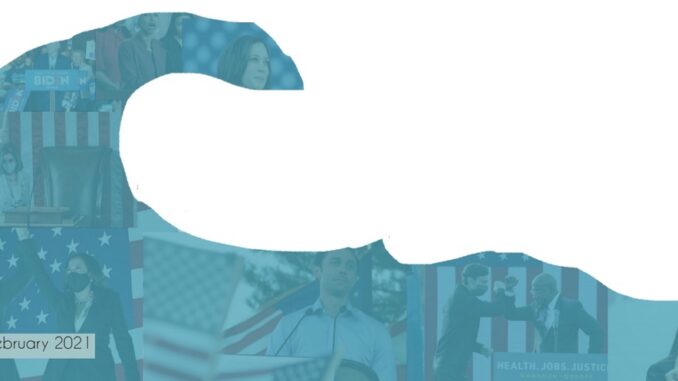
photo illustration: Abby Robinson
The “Blue Wave” seems to be in high tide as democrats have taken the majority in Congress and the oval office. The next four years are shaping up to be quieter, with President Joe Biden having run on the platform of returning America back to past norms, but what can be expected from this new, blue government?
AP Government teacher John Carmichael posed the beginning question, “What have you seen about Biden in the news in his first couple weeks, other than executive orders?”
Carmichael makes a good point; there hasn’t been any big personal stories or big issues coming from the White House that get sent to debate on Fox and CNN like we’ve seen for the past four years. The president has already seemingly tried to return politics to being about legislation, rather than erratic bursts of statements that send the country against itself with each headline.
What President Biden has done, though, is made a list of executive orders repealing and reversing Trump’s big points from his presidency. Within his first days in office, the president rejoined the Paris Climate Agreement, posted his plan for vaccination and economic relief and reversed the Muslim ban.
Senior member of Politico Club Grace Wang discussed the quick reversal of the former president’s controversial orders, saying they’ve put her at ease.
“Biden’s flurry of executive orders within the first couple of days definitely quells some worries I’ve had about the long-term effects from Trump’s presidency. A lot of decisions focus on reversing climate change decisions from the previous term,” Wang said.
She stated that she feels that she can relax a little after the new orders, and that her self-professed job of informing others has been released.
“I feel a lot better about deliberate actions against the climate crisis, rather than trying to educate and convince the public that climate change and environmental endangerment is a very real and scary thing,” Wang said.
Although Biden has done much to give the nation new, democratically viewed rulings, the blue wave cannot be entirely claimed as having rolled yet, Carmichael addressed.
“I see some modest gains for democrats in terms of policy positions that they’ve learned, but it’s not going to be the sweeping change. The Senate is currently split 50/50. And most people believe you need 51 votes, majority, to pass legislation but that’s not true. You need 60 to make it filibuster proof,” Carmichael said.
Democrats may not even have a majority of votes, though, depending on some of the moderate Senators who have a tendency to swing from issue to issue. Moderate democrats, like Joe Manchin of West Virginia, will occasionally vote red, erasing the assured democratic majority for some bills.
Wang also notes the important role of the government during this term: to restore the faith of many voters across the country.
“Trump’s presidency cause a lot of mistrust in the government and the democrat-majority in the government will have to regain that trust, as well as establish that the government works for the people, rather than against them,” Wang said.
Carmichael sees this happening, as over the next four years we can expect normalcy from the fresh president of Delaware.
“He’s a legislator, meaning he compromised in the Senate, that’s what his reputation was. And so, who did he have to the White House on Monday. 10 moderate republicans, he didn’t have the democrats there. He’s looking to work with them. I think, consequently, you’re gonna see him achieve more legislatively than Trump did. Even though we’re polarized right now,” Carmichael said.
The nation needs issues that parties can come together on, and Biden is looking to try to make compromise happen. He’s looking at less partisan issues to tackle, already trying to get COVID relief passed and out to the people, and will begin looking at infrastructure as his next goal.
No matter what the government does, it’s important that citizens are watching to lobby for issues and call them out when necessary. Wang explained just how important it is that students pay attention to politics, even in high school.
“It’s always important to not only seek out political information, but doing so wisely, consistently, and carefully,” Wang said, “To pay attention to politics is to reach beyond the bubble of your surroundings, whether that’s privilege or poverty, and understand your country in a broader scope. It’s also important to learn from politics and it’s inner workings so that lawmaking mistakes will not happen again.”


